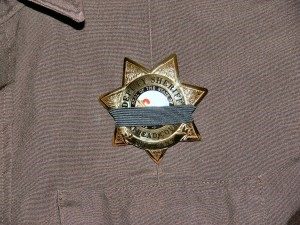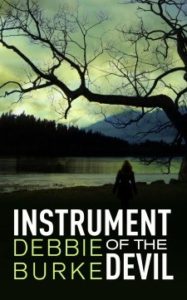By Debbie Burke
The Scene of the Crime
Last year, I became the victim of an attempted sexual assault in broad daylight.
An assailant stuck a gun in my back, dragged me into a dark, deserted barn on the county fairgrounds, and tried to rape me. When he put down the gun as he tried to tear my clothes off, I kicked him where no man wants to be kicked. He escaped out the back of the barn.
I survived completely unscathed…because, fortunately, I was not a real victim, but a role player in a law enforcement training scenario.
Alumni of the local Sheriff’s Citizens Academy get tapped from time to time as role players in training sessions for reserve officers, the posse, and search and rescue. Since I completed the Citizens Academy, I’ve walked heel-to-toe in a mock traffic stop for drunk driving. I portrayed the hysterical mother of a child injured in an accident. I played a victim of a medical emergency, which turned into a bona fide emergency when a swarm of yellow jackets stung me!
Photo by Lynette Schimming, Thompson Falls, MT
The sexual assault scenario mentioned above was part of the training for posse and reservists who respond to emergencies at the county fair. Each trainee team answered mock radio calls from a 911 dispatcher about various crimes, in addition to lost children and heart attacks. Trainees rotated through stations staged around the fairgrounds, while deputies and police officers observed and evaluated how they handled each situation.
A deputy staged the scene beforehand: drag marks in the dirt, signs of a struggle in the stall, a fake gun left on a shelf by the attacker, and footprints leaving the barn. Then each team would rotate in turn to our station.
The lead instructor had already briefed trainees about their duties. In the sexual assault scenario, they were supposed to interview the victim (me), call for medical assistance, and broadcast the assailant’s description on the radio. Then they would secure and preserve the crime scene until regular officers relieved them.
Cops love to tell stories. My favorite part of the exercise was during down time between rotations. That’s when the story-telling began—a great opportunity for me as a writer to pick up details, nuances, and subtleties that lend authenticity to crime novels.
Since the county covers 5000+ square miles with only four deputies on duty each shift, stories abound of the resourcefulness required when responding alone to calls in remote locations.
A CSI related the tale of an overweight officer who’d taken a lot of kidding about his size. Late one night he arrested a rambunctious suspect who, despite being handcuffed, kept trying to run off. With backup seventy-five miles away, the deputy had to find a safe way to further restrain him until help arrived. So he spent the next forty-five minutes…lying on top of the suspect.
His fellow officers still kidded him, but with respect for a guy who used the tools at hand to solve a problem.
Because of a rash of ambushes on law enforcement, most officers were wearing a black band over their badges. In a lowered voice, a veteran deputy with fifteen years’ service confided, “My six-year-old just told me, ‘Dad, I don’t want you to be a police officer anymore.’” That poignant sentence spoke volumes about the family life of cops. It will stay with me for a long time.
Back to the training session. One trainee earnestly wrote down my description of the would-be rapist. Another reassured me that I was safe. Others took the initiative to clear the barn and search for the suspect.
After each team completed the exercise, the evaluators critiqued their responses. One team did not enter the barn at all. When the evaluator asked why, the answer was: “We could see the gun from where we were outside, we didn’t know if the perpetrator was still around, I wanted to keep my partner in sight.” They received a nod of approval from the evaluator.
Another team split up—one talked with me, while the other cleared the barn, checking stalls with a flashlight, careful to avoid the footprints and drag marks. Again, a nod of approval.
According to the evaluator, both approaches were appropriate since trainees took their individual limitations into account and did not compromise safety.
And then there was the posse volunteer who proved the adage, you get what you pay for…
This trainee had clearly never watched a single episode of CSI. Upon arriving at the scene, he immediately rushed into the barn and stomped on the footprints and drag marks. Then he grabbed the gun, obliterating the attacker’s prints.
The evaluator took him aside…for counseling.
After training ended, we ate lunch and reviewed the volunteers’ performances. Feedback from the 911 operator was especially useful. She cautioned if a responder didn’t answer a radio call, the operator might assume trouble and dispatch assistance, when, in fact, the responder simply forgot to acknowledge a call. Big oops.
Taking the course can broaden your education and add verisimilitude to your novels.
Besides, it’s not often one becomes a “victim” without suffering any trauma. Role-playing is far preferable to the real thing!
TKZers, what are your favorite tools to lend authenticity to your stories?
When she’s not playing a crime victim, Debbie Burke writes about them. Her new thriller Instrument of the Devil is available on Amazon.




Sounds like fun.
My daughter and I are theatre people who sometimes participate in mock scenarios. When Daughter was in high school she played a tornado victim at a mock disaster staged at Universal Studios. As you can imagine, the makeup was superb. When I picked her up, she was covered in blood and had a giant shard of glass sticking out of her forehead. She was still in drama queen mode when we ended up passing a police car. She pressed her face against the car window and I’m sure looked tragic.
She was very upset when the police officers didn’t even glance in her direction.
“You could’ve been a kidnapper, Mom! I could be dead by now!”
She had a point. The rest of the way home we worked out the plot of the evil kidnapper, frantic mom, and clueless police.
I should probably dust that off. It was pretty good.
Definitely dust off that idea, Cynthia.
Probably a good thing the cops didn’t notice your daughter, or you might have had to answer some serious questions!
Fascinating post, thanks. The two things that stand out are the yellow jackets (I’m SCARED of bees!), and the child who didn’t want his dad to be a police officer anymore.
In my twisted family we play a game when we see something out of place. If there is a lone man’s shoe in the ditch, we make up horrid stories about how the shoe got there, and where are the rest of the victim’s clothes? If there is a plastic bag in the woods, why didn’t the perp bury the evidence instead of just tossing it aside in a bag? The perp must have been in a hurry because the hounds were on his trail. See? twisted family!
Doesn’t sound the least bit twisted to me, Priscilla!
Oddest object I ever saw while driving was on a remote deserted road outside Colorado Springs. Caught in some bushes was a wedding veil. Always wondered about it. Someday a short story may grow out of that sighting.
LOVE the Writers’ Police Academy. I’ve attended 5 times and always learn new stuff. Worth the price just to hear John Gilstrap’s sessions on things that go boom.
I’ve also taken a Citizen’s Police Academy course when I lived in Orlando (nothing like that up here in teeny tiny Teller County, but they do have a ride along program), and made some great contacts there.
And I totally agree with this: “Cops love to tell stories. My favorite part of the exercise was during down time between rotations. That’s when the story-telling began—a great opportunity for me as a writer to pick up details, nuances, and subtleties that lend authenticity to crime novels.”
I asked a homicide detective I’d met at a Civilian Police Academy session if I could buy him a cup of coffee and ask him questions. He said, “Is there an Ale House near you? Can I bring friends?”
Of course, I said yes to both and I sat back and listened to their banter. It turned, almost verbatim, into a scene in one of my books.
So true, Terry. Once you get cops started, they will write your book for you!
Sounds like a blast, Kathryn! Last year, I attended Writers’ Police Academy, an experience I highly recommend. I’ve squirreled away two juicy tidbits I haven’t used yet, both garnered from a bomb expert I cornered in the communications van. With so many writers in attendance, I couldn’t leave until I’d learned something no one else heard.
I’m lucky to have a boatload of law enforcement friends who love to share stories. The only problem is, truth is stranger than fiction. Some of the cases are so bizarre, if I used them no one would believe they stemmed from real-life. Readers would think I’d lost my mind. LOL
Sue, I’ve heard similar stories that no one would believe…except they actually happened.
Other incredible tales come from a good friend who’s an ER doc. There is no limit to the human imagination and the infinite ways people can get themselves into trouble.
Debbie, I looked quick at Kathryn’s name and assumed she wrote the post. That’ll teach me to comment before my morning tea. So sorry!
No one is held responsible for actions committed before caffeine 🙂
I’m not a crime writer, but most of my characters are fighters. I guess that came because I’ve been a martial artist for fifteen years. I’ve grown to know my body, and over the past five years I’ve really been focusing on technique and learning what strikes are used in which situations.
Besides that, I read a lot of fantasy that includes fighting. As I mentioned in a comment on a post last week, one of my favorite authors builds a lot of scenes around her main character learning sword-fighting and hand-fighting. When I started writing my own stories, I got really excited and found a book on armor, but when I found out that british armor is different than French armor which is different from roman armor, I bailed and haven’t looked back. Still, sparring gear protects the same areas as armor does, so until I need very specific information, I’ll leave it alone.
Recently I found a book called The Art of Warfare and Fantasy outlining just how a war is done and all the considerations that go into it–reasons for starting a war all the way to how to supply an army. I would recommend it to anyone writing about war even if you don’t write fantasy.
AZAli, education is never wasted. I should consult you for my next fight scene 🙂
What a wonderful experiences for you, for both professional and personal use.
I’m currently halfway through my town’s Citizen’ Police Academy. I love it and the officers teaching it are quite professional and approachable. Next week, we’re visiting the local House of Correction. We were told not to were any jewelry or hair accessories of any kind.
TL, all officers who presented classes I attended were extremely professional. They seem to feel a great responsibility to put the department’s best foot forward.
“We were told not to were any jewelry or hair accessories of any kind.”
Edit: We were told not to “wear.”
I used to be a dispatcher for 911 for a sheriff’s department in Southern Illinois. In the two years I was there, I have enough stories I could tell them forever to anyone who wants to listen.
In that time, I also got to see how the department works. How procedures are carried out and how the chain of command is so very very important. There are tons of rules and regulations and they are there foe a reason.
Brett,
One evening during our Academy was devoted to visiting the 911 center. The ability of dispatchers to stay cool under stressful circumstances is amazing. Our center had a “decompression room” where dispatchers could go after difficult calls. That gave me a whole new appreciation for that tough job.
Great post! A behind the scenes look at law enforcement is interesting and awe inspiring. We owe a lot to our men and women who wear the uniform.
I have several “advantages” to being a thriller writer. First, I have been the victim of sexual assault, and almost killed during the assault. Life is different after that experience.
Second, and a happy part of my story, I married a police officer. After 34 years in law enforcement, he has some amazing stories to tell, some funny, some not.
I giggled when you mentioned the overweight officer lying on his arrestee. My husband took some kidding after he hailed a cab to chase down a man high on meth. When the cab caught up with the man, he jumped out and tackled him. The other officers were short of breath when they finally caught up.
I also I can relate to the isolation of some jurisdictions. My husband patrolled an area of over six thousand square miles, alone. He was the only officer on duty, often three hours away from any help. The area has a higher violent crime rate than a big inner city ghetto. My stress level has dropped dramatically since his retirement.
Wow, Cecilia, you sound as if you have a really healthy attitude toward a horrible experience. So glad you’ve been able to overcome it.
Your insider’s view must really enhance the authenticity of your writing.
And yes, we civilians too often don’t fully appreciate the dangers and stress to those brave men and women who protect us. Thank you to your husband. Glad he retired safely.
Thank you, Debbie. Those are very kind words in a world against officers, for the most part. I’ll pass your words on to him.
As for my attitude, ten years of therapy and a lot of faith do wonders. 🙂
…And writing helps too!
Yes!
This was an excellent post. Thank you, Debbie. As a result of reading it, I’m going to search around for a similar educational opportunity in my area. It not only provides insights for writers, but sends a great safety message to everyone.
Thanks, Frances. Our Montana community has a pretty small population yet offered the Academy program. I would think it should be available in most cities.
Pingback: Writing Links 10/30/17 – Where Genres Collide